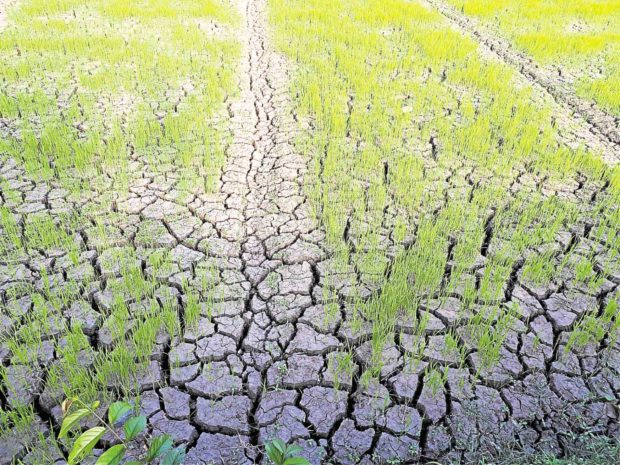
FILE PHOTO: Cracks appear on the soil in rice lands due to lack of water in irrigation canals in Libon town in Albay province. The Department of Agriculture (DA) said in its El Niño bulletin issued on January 30, 2024, that farmers in Western Visayas and the Zamboanga Peninsula had suffered at least P109.44 million in losses due to the effects of the climate phenomenon. INQUIRER FILE PHOTO / MICHAEL B. JAUCIAN
MANILA, Philippines — Farmers in Western Visayas and Zamboanga Peninsula lost at least P109.44 million due to the effects of the El Niño climate phenomenon, the Department of Agriculture (DA) has reported.
In its El Niño bulletin issued on January 30, the DA-Disaster Risk Reduction and Management Operations Center said the prolonged dry spell affected 2,602 farmers, tilling 2,177 hectares of land in the two regions.
The DA estimated the volume of production loss to be at 4,738 metric tons – most of which were rice.
The climate phenomenon is characterized in the Philippines by below-normal rainfall.
READ: Drought damage to Zamboanga rice fields reaches P717,000
In a previous advisory, the Philippine Atmospheric, Geophysical and Astronomical Services Administration (Pagasa) said a “strong El Niño” will prevail over the country until February.
“Majority of global climate models suggest that El Niño will likely persist until the March-April-May 2024 season with a transition to Enso (El Niño Southern Oscillation)-neutral in the April-May-June 2024 season,” Pagasa’s advisory also noted.
Enso-neutral pertains to weather conditions that are neither labeled as El Niño nor La Niña, according to the state weather agency.
Action vs El Niño
The government has taken steps to curb the phenomenon’s effects on agriculture and aid farmers in adapting to the dry spell.
READ: El Niño feared stifling PH agri output in 2024
Among DA’s actions were regularly monitoring weather conditions and actual ground situation; disseminating advisories and agro-meteorological information to farmers via Facebook Messenger; and informing farmers about proper crop management during El Niño.
The DA further said in its bulletin that it also validates areas vulnerable to dry spells, assesses areas before cloud seeding operations, and adopts drought-resistant crop varieties.

